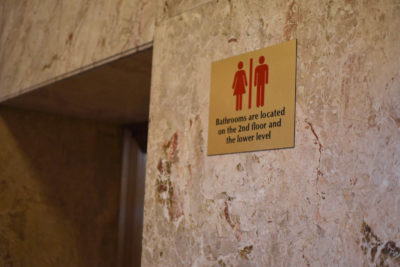
Privatization of restrooms on the first floor of Boston University’s College of Arts and Sciences has some people concerned about a lack of student accessibility, particularly for those with physical disabilities.
While there are five restrooms per floor in CAS, four of the restrooms on the first floor have been privatized for faculty and staff use, said James Anderson, a BU earth and environment professor.
Michaela Dwyer, a junior in CAS, said that while students have access to restrooms on other floors, it can be difficult to access them by elevators. This problem is also present in other areas on campus, such as the Bay State Road brownstones.
“All of the brownstones are not handicap accessible,” Dwyer said. “They do have elevators in the biggest places … I live in a brownstone, so I know that there’s nothing in there.”
Anderson said he noticed the lack of student restrooms on the first floor when he first came to BU in 2011. He said he was immediately concerned about accessibility issues for students with physical handicaps.
“This does not seem appropriate, because this building is public,” Anderson said. “Ultimately it’s here to serve students, and the students are having to go elsewhere to find a bathroom.”
Anderson took his concerns to Tom Daley, the associate vice president for BU Facilities Management & Planning, in 2012, but was told that it would be up to the CAS to reverse the privatization. He was also told that no students had ever complained about accessibility.
“I said, ‘well, students don’t know to complain. They don’t see that [the restrooms] are not there.’” Anderson said. “It’s up to faculties and staff to observe inequities and to respond to them before they do become an issue.”
Anderson said that students he had spoken to about the issue were also surprised by the lack of restrooms.
“Mostly, [students] were not aware where [the restrooms] went … They come and go to classrooms,” Anderson said. “I have an office in this building, so I’m here every day, and I observe. When I do mention this to the students, they all think it’s pretty weird.”
Angela Egger, a sophomore in the Questrom School of Business, said she thinks the lack of retrooms is a general inconvenience as well as an issue of accessibility.
“I think it’s kind of inconvenient if you have a class on the first floor,” Egger said. “You either have to go down to the basement or up a floor. I think it’s kind of weird that there’s nothing there.”
After Anderson spoke with administration in 2012, one women’s restroom in the far east end of CAS, previously restricted to the information technology department, was opened to students. There is still no bathroom for male students.
Lorraine Wolf, the director of BU’s Office of Disability Services, said that while the restroom situation is not ideal, BU is not required to deprivatize the restrooms on the first floor.
“It’s not required for us to have a bathroom on every floor, as long as there’s bathrooms within ready access,” Wolf said. “While again, it would be great if we had broader access, privatizing bathrooms for other use, in and of itself, isn’t a problem.”
Wolf said other areas within BU have had issues with accessibility, including the library. Wolf said she encourages students who notice access problems in buildings to let her know.
“We can have a look at buildings to see if there’s something we can do to mitigate them,” Wolf said. “For example, we’ve been working in the library, and that was on the basis of a member of our community who reported an access problem.”
Sarah Burstein, a senior in the College of Communication, said she has noticed the lack of bathrooms over the years and sympathizes with students for whom it poses an accessibility issue.
“I know there are some places where it’s much more difficult to even go into a building if you do need accessibility,” Burstein said. “I’m sure it could always be better and there could always be improvements made.”























































































































